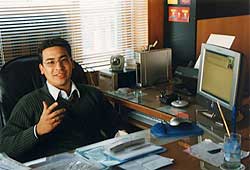Saurav Jyoti is a third-generation entrepreneur from a family-run Nepali business house, the Jyoti Group, which has interests in trading, manufacturing and lately in hydropower. Nepali Times talked to him about the economic situation, prospects and Jyoti Group's future plans.
 How has the economic situation affected business?
How has the economic situation affected business?
Even during these difficult times, we have not been as affected as other players in this segment. The crisis has been more of an opportunity. When there is a crisis like this, bigger players in the market are affected more. Since we are smaller we are affected less. At Philips, for instance, we have doubled our sales every year in the last two years. So we are very optimistic that with the situation improving and the peace talks taking place, things will get better and our business will also grow many folds more.
It seems to be a paradox that despite the crisis and lower purchasing power, sales are up. How do you explain that?
We are very young in this market. The others have been here for decades and they are very established but when there is a slump, the bigger guys have more layoffs. We are just coming into the market and are more aggressive. It helps that Philips customers tend to be more techno-savvy. They know about the products they want to buy. Such people are better customers, and sales are not as buffeted by an economic slump.
How about your other products, like cars?
Honda cars are a long-term investment. Our new set-up of the three-S facility service has been a big investment, but we are looking beyond just short-term gain, keeping in mind the future. But again, despite the situation, we are doing reasonably well with sales. This could be due to the worldwide brand recognition of Honda as a quality product that customers trust. But even then we were prepared for the worst.
You are one of the traditional Nepali family houses that has had to adapt to modern business and managing practices. How has the transition been?
We are beginning to make the transition, but we may be a slightly conservative group. Change is inevitable and necessary. It is beginning to take place but perhaps not as quickly as one would like it to. Overnight transition is also not possible, and may not be desirable. This is a family business that is almost 45 years old. We have a lot of people who have been with us from the beginning, and there are benefits to having all that experience, loyalty and trust. With the transition to modern management, you may find more efficiency and productivity, but there may be other traits you cannot buy in a manager. So, there are pros and cons. The new ventures we are getting into require hiring totally new staff and professionals. We have to go about bringing slow changes with older established companies in our group.
Your group is getting into ceramics, what are your other future expansion plans?
Actually, ceramics is not new to us. My grandfather started Himal Ceramics which made traditional red clay tiles in Bhaktapur. The new modern factory in Panchkhal called Jyoti Ceramics, is the biggest tile factory in Nepal that makes a variety of basic tiles in different sizes. Despite delays, production will be starting soon. We are very excited about this project. Demand for traditional tiles is growing with the renaissance in traditional architecture in Patan and elsewhere. In the second phase we may invest in a glazing unit to make modern tiles.
Any other areas?
Jyoti Group is now also into hydropower. We are a part of BPC with a consortium of investors. We are very optimistic about hydropower. It is the future of Nepal, and if we exploit the potential it could kickstart the economy. We are glad that the government finally pushed through the privatisation after so much delay.
What is holding business back in Nepal? Is it corruption, lack of political will? What do we need to do to promote investment, create jobs and move forward?
The first thing at the moment is obviously peace. We need the restoration of peace so foreign and domestic investors will regain confidence in investing again. After that, the main factor affecting a country's economic growth is political stability so that there is a continuity of policies, accountability and visionary leadership. We're basically talking about ways to ensure good governance, after that things will automatically pick up. Without that, I don't see Nepal improving.
In a country like Nepal, do business houses like yours have a mission statement where you look beyond profit at the common good?
Yes, we do. From my grandfather's time, we have always looked beyond profit. Profit per se is not bad. You need it to keep things going. But that is not all. In our mission statement, we've addressed community upliftment. Being Newars, we are committed to various community development activities. You don't hear much about this because we don't make a big fuss, but the idea is to give back to the community what it has given to us over the years.


